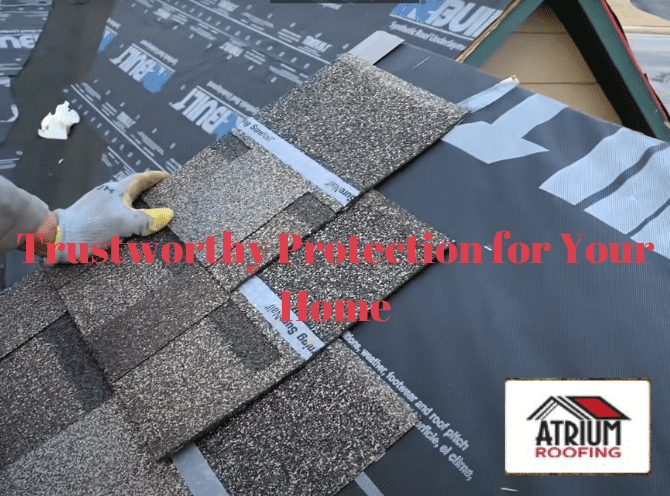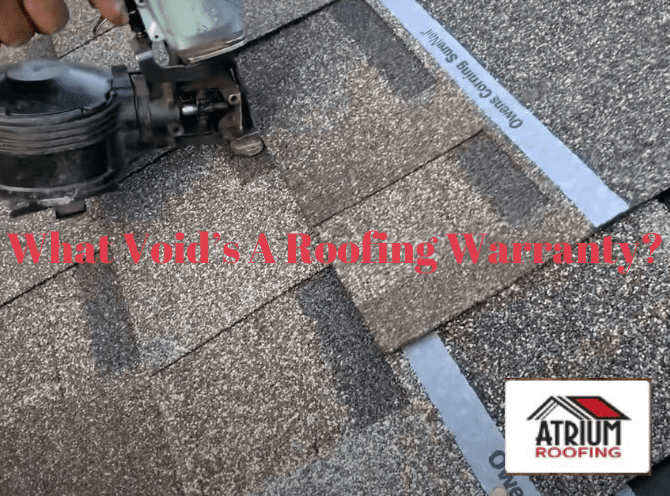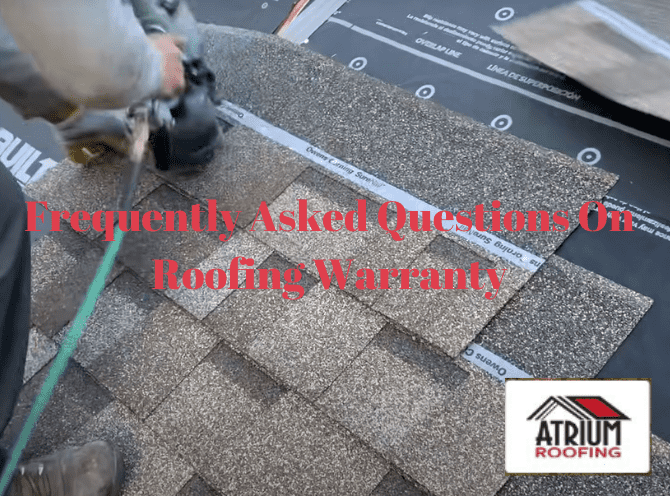Roofing Warranty offers protection against material defects and installation errors. It is a commitment by manufacturers or contractors to repair or replace faulty roofing components. Selecting the right roofing materials and a reliable installer is crucial for homeowners who seek peace of mind for the long-term performance of their investment. Roofing warranties come in various forms, typically categorized as manufacturer warranties and workmanship warranties. Manufacturer warranties cover issues with roofing materials, while workmanship warranties pertain to the labor aspect of a roofing project.

What Is Roofing Warranty?
Roofs protect our houses from rain, snow, and sun. Like everything, roofs need care too. A Roofing warranty is a promise from the manufacturer or contractor. It covers the performance of your roof. Early failure or defects? The warranty steps in to fix them. It’s important to understand what a roofing warranty is and what it offers. This crucial investment for your home is below.
Types Of Roofing Warranties
A strong roof above your head is more than just a layer of protection. It is a complex system requiring precise installation and quality materials. The warranties for this crucial part of your home are key. Roof warranties safeguard your investment. They differ in coverage and conditions. these differences ensure peace of mind against future issues.
Manufacturer’s Material Warranty
This warranty comes from the company that made the roofing materials.
- It covers things like tiles and shingles.
- If these parts break early, the company helps you.
- It usually does not cover bad installation.
Manufacturer’s System Warranty
This one is a bigger promise than just the materials.
- It covers more parts of the roof.
- It might also help with problems from a bad installation.
- This warranty is good but can be harder to get.
Workmanship Warranty
This warranty is from the people who put the roof on your house.
- It makes sure the roofers do a good job.
- If they make a mistake, they have to fix it.
- This does not cover the materials.
Full System Warranty
This one is the strongest of all the warranties.
- It covers both materials and workmanship.
- This means you have lots of protection.
- But, you must usually use certain roofers to get it.
Contractor’s Warranty
The contractor’s warranty is crucial too. It backs the workmanship of the installers. This warranty is less about the materials and more about the quality of the installation. A good contractor’s warranty will cover:
- Labor: Errors during installation.
- Leak Repairs: Fixes for any leaks not caused by external forces.
The duration and terms can vary greatly between contractors.
Extended Warranty
An extended warranty can offer the longest and most comprehensive protection. This type of warranty requires extra investment but can include:
- Broadened coverage for materials and workmanship.
- Protection that goes beyond standard warranties.
- Often, an extended warranty needs registration and regular roof maintenance.
When choosing a roofing warranty, balance the coverage scope against the additional cost. More coverage can translate to higher up-front costs, yet greater long-term savings.
Tips for Managing Your Roof Warranty
Getting a warranty is not the last step. You should still take care of your roof.
- Read the warranty well. Know what it covers.
- Keep your warranty papers safe.
- Hire good roofers to work on your roof.
- Do regular checks on your roof.
- If a problem comes up, talk to the warranty giver fast.
Importance Of Roofing Warranty
Your roof is a shield for your home. It’s costly to repair or replace. A warranty offers peace of mind. It ensures your financial protection if things go wrong. Choose the right warranty to safeguard your investment. Protects against material defects.Covers costs from improper installation. It may increase home value.
Important Warranty Terms To Know
| Term | Meaning |
| Coverage Period | How long does the warranty last? |
| Prorated | Coverage lessens as the roof ages. |
| Non-Prorated | Coverage stays the same over time. |
| Transferability | Can you give the warranty to a new owner? |
| Exclusions | What the warranty does not cover. |
These terms affect how your warranty works. It’s good to know them.
The Coverage
When investing in a new roof, it’s crucial to understand the warranty. This document is your safety net if issues arise. Roofing warranties can be complex. their secrets to ensure you are well-informed.
Components Covered By Roofing Warranties
Roofing warranties safeguard your investment but each warranty differs in coverage. It’s essential to know what’s included.
- Materials: Manufacturers often cover defects in shingles or tiles.
- Workmanship: Some warranties protect against installation errors.
- Roof System Components: Underlayments and other key elements might be included.
Exclusions And Limitations To Be Aware Of
Not everything falls under a warranty’s protection. It’s important to note the exclusions.
| Exclusion | Reason |
| Acts of God | Events like hailstorms or tornados are often not covered. |
| Improper Maintenance | Failure to maintain your roof can void the warranty. |
| Pre-existing Problems | Issues before the warranty period might be excluded. |
Limitations also play a part. They often cap the duration of the warranty or limit the compensation. Make sure to review these closely.
How Long Does A Roofing Warranty Last?
When investing in a new roof, the warranty is key. A solid roofing warranty can offer peace of mind and save money. the lifespan of these warranties and the factors that affect their duration.
Average Duration Of Roofing Warranties
Roofing warranties can vary greatly in terms of length. They are not one-size-fits-all. Warranties depend on the material and the manufacturer.
- Asphalt shingles may have warranties from 10 to 30 years.
- Metal roofs can have longer warranties, sometimes up to 50 years.
- Rubber or flat roofs offer different time frames, often between 10 and 20 years.
Some manufacturers offer limited lifetime warranties. These are premium options. Their definitions can differ based on terms and conditions.
Factors Influencing Warranty Length
Several elements can impact the length of a roofing warranty:
- Material quality: Higher-grade materials usually come with longer warranties.
- Installation: Proper installation by certified professionals can extend warranty lengths.
- Manufacturer: Different manufacturers offer varied warranty terms. Researching beforehand is essential.
- Roof type and pitch: The design of the roof may influence the warranty period. Regular maintenance can also play a crucial role. Many warranties require ongoing upkeep. Without it, warranty coverage might be voided.
Be sure to read all warranty information. Look for what is covered and what might lead to a void warranty.
Benefits Of Roofing Warranty
When investing in a new roof, a comprehensive warranty offers many advantages. Homeowners need to understand the benefits. A robust roofing warranty protects your home, reduces worries, and can increase your property’s value. Let’s delve into the key benefits homeowners enjoy with a comprehensive roofing warranty.
Protection Against Material Defects
Everyone deserves a sturdy, reliable roof over their head. With a comprehensive roofing warranty, this becomes more than just a wish. Here are the perks:
- Coverage: Major defects in roofing materials are covered, which means you won’t have to pay extra for repairs.
- Durability: Quality materials with a warranty last longer, ensuring your home stays protected.
- Cost Savings: Avoid unexpected expenses from sudden material failures.
Peace Of Mind
Your family’s comfort and safety are crucial. Here’s how a warranty can bring tranquility:
- Confidence: Knowing that your roof is under warranty helps you sleep better at night.
- Support: Reliable assistance is available if roofing issues arise, so you’re never alone.
- Stress Reduction: Minimize worry about future roofing problems with a solid warranty.
Increased Property Value
A secure, warrantied roof can boost your property’s market appeal. Here’s how:
- Attractive to Buyers: A house with a warranty-protected roof is more desirable.
- Proof of Quality: A warranty signals buyers that the roof is made of high-quality materials.
- Investment Protection: Bolster the long-term value of your property with roof warranty coverage.
Common Warranty Claims And How To Handle Them
Roofing warranties protect your home from unexpected repairs. But, it’s key to know common claims and ways to handle them. This keeps your home safe and avoids warranty issues.
Storm Damage
A storm can harm your roof. Often, this leads to warranty claims. To handle these claims, document the damage right after the storm. Photos and notes are crucial. Then, contact your warranty provider quickly.
Leakage Issues
Leaks are common warranty claims. A leak can cause major damage. Spot leaks early and report them. Use a professional roofer for repairs. This ensures your claim is valid and your home stays dry.
Proper Maintenance And Inspection
Regular maintenance is part of your warranty. Neglecting it can cause issues. Schedule annual inspections to catch problems early. This helps keep your warranty valid and your roof in top shape. Use licensed professionals for maintenance to ensure quality.
- Check for damage regularly.
- Clean your roof to prevent issues.
- Get yearly inspections by pros.

What Void’s A Roofing Warranty?
Imagine a new roof on your house. It looks great and feels secure. But what if something happens to it? What if your safety net the warranty suddenly disappears? Knowing what can void a roofing warranty helps keep your roof covered for longer. the most common reasons a roofing warranty might lose its power.
Improper Installation
Getting a roof installed correctly is key. Mistakes during installation can lead to big issues. Manufacturers have strict rules. If roofers ignore these rules, your warranty could be at risk. The roof must meet the standards the warranty sets.
Failure To Perform Regular Maintenance
- Roofs need check-ups, just like cars need oil changes.
- Without regular maintenance, small problems can turn big.
- Ignoring these can void your warranty.
Unauthorized Repairs
Roofs sometimes need fixing. But be careful who fixes it. Not everyone is allowed. If someone who’s not approved works on your roof, the warranty might not work anymore. Always choose approved professionals for repairs to keep your warranty intact.
How To File A Claim
Filing a roofing warranty claim might sound daunting, but it doesn’t have to be. the steps can help you navigate the process swiftly. Here’s what to do if you find yourself needing to file a claim for your roof.
Contacting The Manufacturer Or Contractor
Start by contacting the roofing material manufacturer or the contractor who installed your roof. They can inform you about the claim filing process. You’ll likely need to provide details of your issue, so be ready with your contract and warranty information. Most contractors offer a direct line or support form for warranty claims on their website.
Providing Necessary Documentation
Gathering documents is key. You will need a copy of your warranty, proof of purchase, and photos of the damage. A detailed account of the problem helps, too. Organize these files for quick submission. They act as evidence and are crucial for a successful claim. Check the manufacturer’s website for a claims form, or ask your contractor for guidance.
Extending The Lifespan Of Your Roof
Every homeowner wants a roof that lasts. A strong warranty backs up your roof. But actions to extend its life are key. This means routine checks and smart measures. Read on to learn how.
Routine Inspections And Maintenance
Regular check-ups keep roofs healthy. Like you visit a doctor, your roof needs a professional eye to spot issues early. Spotting a small problem early can save your roof. Think of it as regular health checks for a long life.
Why Regular Inspections Matter:
- Detect Damage: Weather can harm roofs. Inspections catch this damage fast.
- Clear Debris: Leaves and branches cause harm over time. Clear them to prevent issues.
- Prevent Leaks: Water damage is a roof killer. Fixing leaks promptly is crucial.
- Sealant Checks: Sealants keep water out. They need checks and touch-ups too.
Plan for a professional to inspect your roof. Twice a year works well. They should check before and after harsh weather. This keeps your roof ready for anything.
Taking Preventive Measures
To stop problems before they start, think about prevention. A little effort now saves a lot later. Your roof is like a shield, and it needs the right armor to stay strong.
Good Practices for Roof Care:
- Gutter Maintenance: Keep gutters clear. This protects the edge of your roof.
- Tree Trimming: Cut back branches. This stops them from scratching your roof.
- Proper Attic Ventilation: This keeps the roof cool. It stops damage from the inside out.
- Immediate Repairs: Fix small issues fast. A small fix today avoids a big one tomorrow.
Investing time and care in these steps can greatly extend your roof’s life. Treat your roof well, and it will do the same for your home. Remember, a warranty is important but works best with these actions.
How to Choose the Right Warranty
To pick the best warranty, ask yourself these questions:
- How long will I live here? If it’s a long time, get a longer warranty.
- What kind of weather does my home face? Bad weather can hurt roofs. A stronger warranty can protect you.
- Is the warranty transferable? If you sell your home, can the new owner use the warranty?
Read the Fine Print
Warranties can be hard to understand. Read everything. Ask questions if you don’t understand. Look for these things:
- How long the warranty lasts
- What is covered and what is not
- If you need to do certain things to keep the warranty good
Pro Tips for Your Roofing Warranty
Here are some expert tips:
- Keep Documents Safe: Save all your roofing papers. You may need them later.
- Regular Inspections: Get your roof checked often. This helps find problems early.
- Maintenance is Key: Fix little roof problems right away. This keeps your warranty working.
Questions to Ask Your Contractor
When you talk to someone about a new roof, ask these questions:
- Can you explain the warranties to me?
- Who gives the warranty – you or the manufacturer?
- What do I have to do to make sure my warranty is good?
The Bottom Line
The right warranty protects your roof. Take your time to choose. Ask questions. Make sure you’re happy with what you get.
Now you know how to find a good warranty for your roof. It’s a big step. But it’s worth it. Your home will be safer. And you’ll be more relaxed.

Frequently Asked Questions On Roofing Warranty!
How Long Do Most Roofers Guarantee Their Work?
Most roofers offer workmanship warranties ranging from 1 to 10 years, but the average is typically around 5 years.
What Is The Warranty On A Roofing System?
The warranty on a roofing system typically ranges from 5 to 30 years, depending on the manufacturer and materials used. Specific terms vary, so consult your roofing provider for exact details.
Is A Roofing Warranty Worth It?
Yes, a roofing warranty is worth considering. It provides financial protection against material defects or installation errors, potentially saving on costly repairs. Always ensure the warranty terms are clear and comprehensive before agreeing.
What Kind Of Warranty Comes With A New Roof?
A new roof typically comes with a manufacturer’s warranty for materials, often ranging from 10 to 50 years, along with a workmanship warranty from the installer, which usually covers 1 to 10 years.
What Is A Roofing Warranty?
A roofing warranty is a guarantee provided by the manufacturer or installer, covering material defects or installation errors for a specified period.
How Long Do Roof Warranties Last?
Roof warranties can last anywhere from 10 to 50 years, depending on the materials and the type of warranty offered.
Can A Roofing Warranty Be Transferred?
Yes, some roofing warranties are transferable to new homeowners, usually requiring proper notification and approval from the warranty provider.
What Does A Typical Roofing Warranty Cover?
A typical roofing warranty covers manufacturing defects in roofing materials and the workmanship quality of the installation.
Conclusion
Your Roofing Warranty is fundamental for long-term peace of mind. It assures you’re covered for future repairs or replacements. Prioritize examining warranty specifics before selecting a roofer. Protect your investment by staying informed on warranty terms a wise move for any homeowner. Choose wisely, and stay covered.
Are you still searching for ‘roofers near me?’ If you have not had your roof inspected recently, Atrium Roofing is here to help. We are a GAF Certified roofing contractor and an Owens Corning® Preferred Contractor, making all of our residential roofing contractors factory-trained. Ready to get started? Contact us today at (210) 806-7171 or (512) 883-7462 or here to schedule a free consultation and a metal roofing replacement estimate!
